20+ Sample Waiver Contract
-
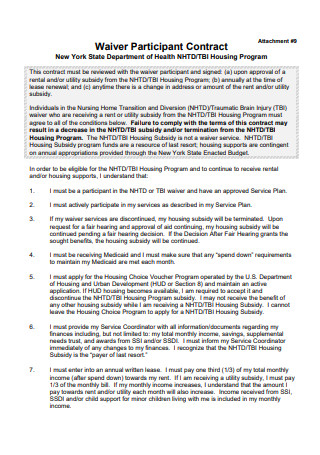
Waiver Participant Contract
download now -
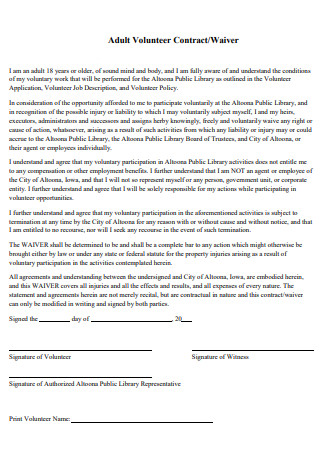
Adult Volunteer Waiver Contract
download now -
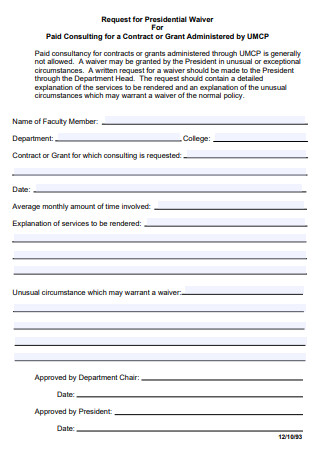
Presidential Waiver Contract
download now -
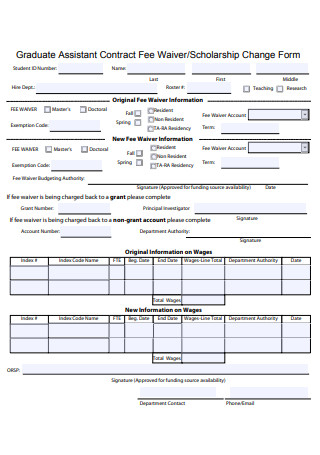
Fee Waiver Contract Scholarship Form
download now -
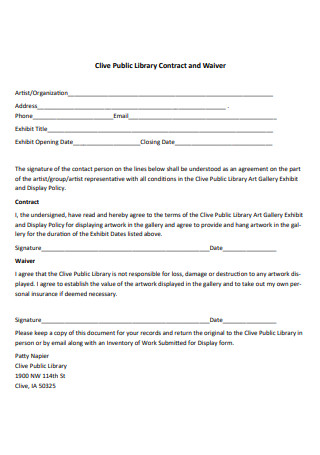
Public Library Contract and Waiver
download now -
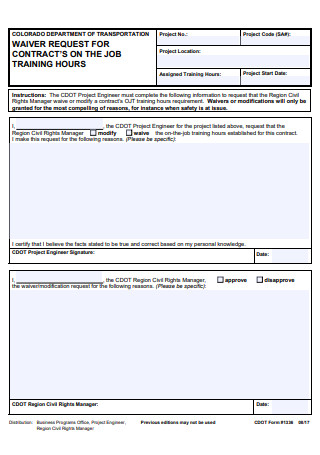
Waiver Request For Contract
download now -
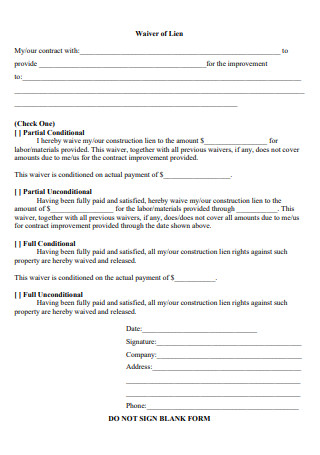
Formal Waiver Contract
download now -
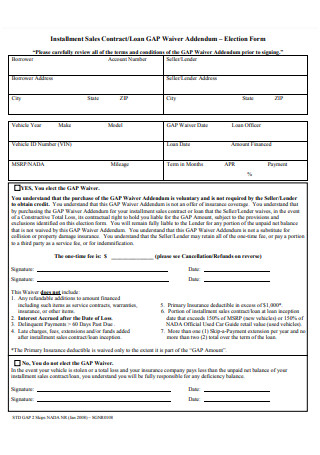
Waiver Installment Sales Contract
download now -
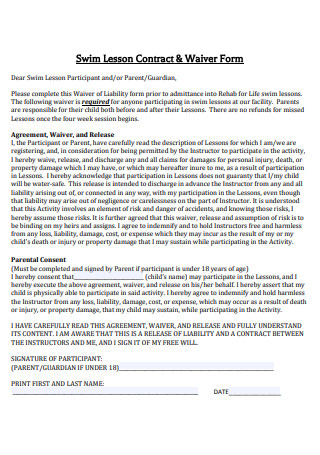
Waiver Form Lesson Contract
download now -
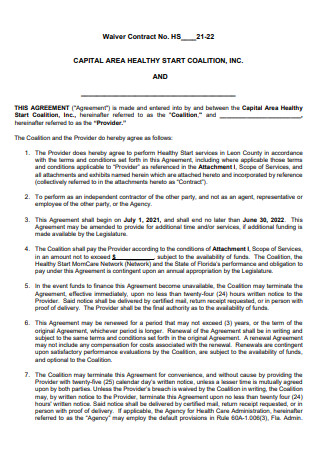
Waiver Contract in PDF
download now -
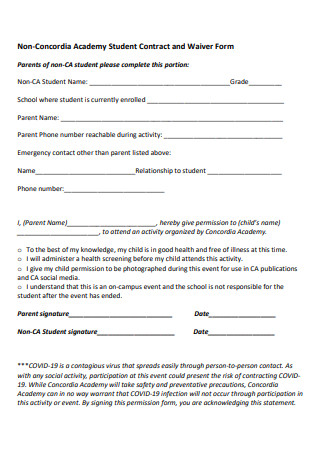
Academy Student Contract and Waiver Form
download now -
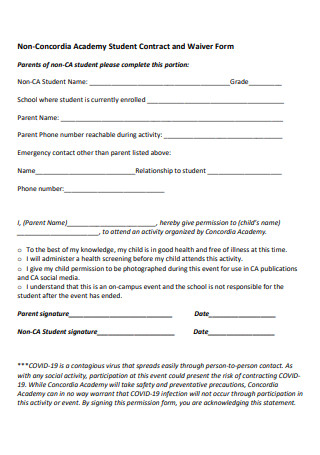
Unemployment Tuition Waiver Contract
download now -
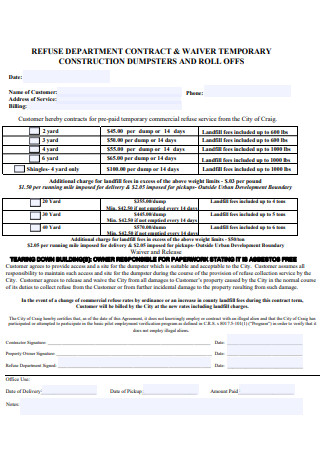
Waiver Temporary Contract
download now -
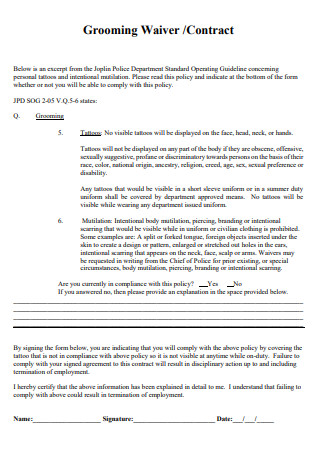
Grooming Waiver Contract
download now -
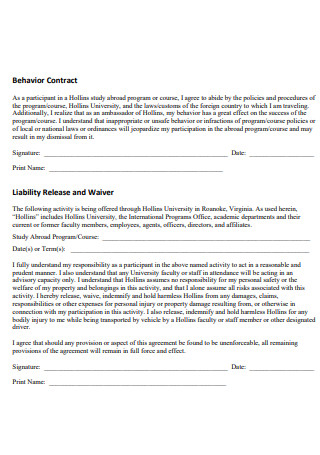
Liability Release and Waiver Behaviour Contract
download now -
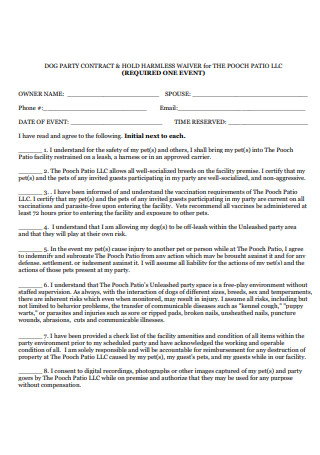
Basic Waiver Contract
download now -
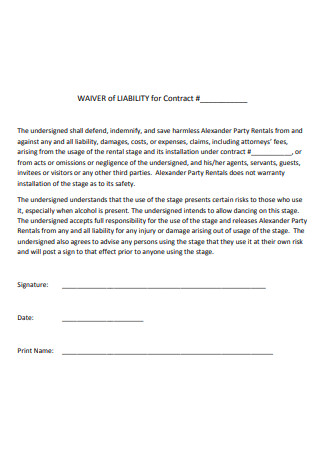
Waiver of Liability For Contract
download now -
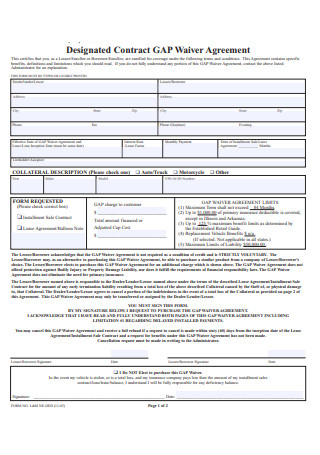
Standard Waiver Contract
download now -
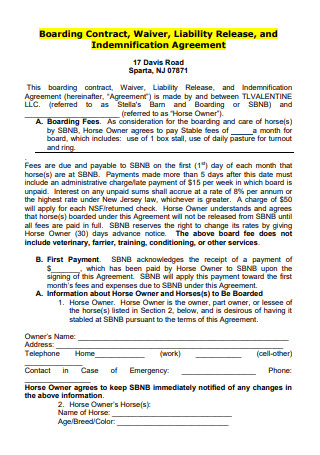
Waiver Boarding Contract
download now -
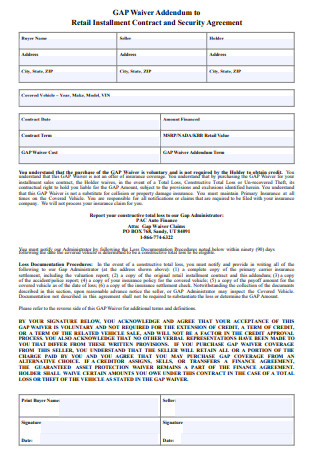
Waiver Retail Installment Contract and Security Agreement
download now -
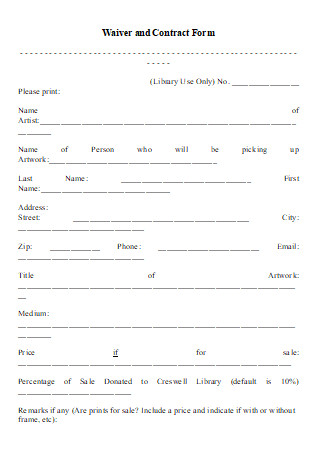
Waiver and Contract Form
download now
FREE Waiver Contract s to Download
20+ Sample Waiver Contract
What Is a Waiver Contract?
What Is a Waiver?
What Is a Waiver by Contract or Deed?
What Is Waiver by Election?
What Is Waiver by Estoppel?
What Are Potential Problems With Breach of Contract Claims?
What Types of Contract Rights Can be Waived?
Two Reasons for Writing a Waiver Contract
How to Create a Waiver Contract
FAQs
How Does a Waiver of a Righ Affect a Contract?
Can a Waiver be Waived at Any Time?
What Are the Variation of the Law of Waiver?
A waiver contract absolves the other party in the agreement of any real or possible liability. Because the party signing the waiver is giving up an entitled claim, they normally do so only in exchange for some additional advantage, such as financial compensation.
What Is a Waiver Contract?
A contract can be waived if one party intentionally fails to complete particular measures or takes proactive action to waive the contract’s provisions. To constitute a legally binding release or waiver of contractual rights, the action must be deliberate and voluntary. For instance, if someone accepts goods but refuses to accept them at the time of delivery or refuses to accept the person delivering the products, this could be construed as a contract waiver. Another method of contract cancellation is to produce a written notification of rejection of the products. However, if the same individual accidentally denied the items because they believed they were a different type of product, this would not be regarded as a contract waiver because the individual did not act internationally or voluntarily.
Contract laws differ by state. Any contract queries or issues, including a contract waiver, should be reviewed with a lawyer in your area who is familiar with the contract laws of that state. Other templates are available on our website, and you can use them whenever you need them. They are as follows: new business proposal, business contract, bid proposals, freelance contract, rental agreement, land contract agreement, learning contract, car-selling contract, sponsorship contract, personal loan contract template, and other similar templates are available. This post will not only provide you with templates but will also provide you with important information that you need to know in order to complete your template.
What Is a Waiver?
In a legal context, the term “waiver” has a specific meaning. The voluntarily surrender or relinquishment of certain and well-known privileges or rights is the meaning of this phrase. For example, if a business decides not to charge a late fee to a client despite the fact that the contract conditions specifically state that a penalty for late payment will be imposed, this could be construed as a waiver of the contract. In order to be called a legal waiver, the party or individual must take voluntary action and eliminate their specific ability or right that was described in the agreement in question. It is possible for a party to waive their rights when they take some type of action or when they offer written documentation of their choice to renounce their rights. The act of relinquishing rights releases the contracting party from any prospective or actual liability. By agreeing to a contract waiver, one party is voluntarily waiving their legal claims or rights in exchange for financial compensation. This action can be used in a variety of different legal situations.
For example, if two parties are settling a legal dispute in court, one side may submit a waiver in order to forgo its rights to pursue additional legal action once the settlement is finalized. Another method of carrying out the action required to relinquish contract rights is to make use of a right that has been specified in an agreement. For example, a contract may provide the right to end the agreement within the first year of the arrangement. It is understood that, by deciding not to cancel the agreement within one year, the party is waiving the right to do so at any time thereafter. It is necessary to have an actual purpose to abandon the right, knowledge of the right, and an existent right in order for a waiver to be recognized valid under the law. The following are examples of waivers: When a party waives its rights, it is implied that the party intends to renounce its rights; when it is expressed that the party intends to relinquish its rights.
What Is a Waiver by Contract or Deed?
This occurs when one party expressly agrees to waive their legal rights in exchange for another’s consent. If all of the standard contract conditions have been met, then such an agreement will be legally enforceable. Settlement or compromise agreements, changes to an existing contract, and a new contract replacing an earlier contract are all examples of this type of waiver. It is important to recognize and keep in mind that it is possible to unintentionally waive a breach of contract by putting it in writing. A statement, such as one contained in an email, letter, or other forms of communication, or even one delivered verbally, may result in a waiver of a breach.
What Is Waiver by Election?
In the event of a breach of contract, the “innocent party” has the option of choosing between two different rights or remedies. This applies in the following situations: In most cases, waiver by-election happens when a contract has an express right or option to terminate or rescind it in specific circumstances, or when one party commits a major breach of the contract, which provides the “innocent” party the right to dissolve the deal immediately. In such instances, the “innocent” party has the option of either terminating the contract immediately or waiving the breach and proceeding with the deal as originally planned. If the innocent party agrees to waive the breach, he or she will not be able to reverse his or her mind afterward.
What Is Waiver by Estoppel?
This is the most general type of waiver, yet it is also the most difficult to distinguish. It is possible for a waiver by estoppel to occur when one party acts in a way that gives the impression that the other party has agreed to renounce their contractual rights. It is not necessary for the other party to commit a breach of contract in order for a waiver to take effect. Two things must be present in order for a waiver by estoppel to be effective. One party must first notify the other that they will do something, or that they will agree not to do something, that they would otherwise be entitled to do under the contract by notifying them in writing. Second, the other party must be able to rely on it. It is generally difficult to determine whether or not a waiver through estoppel has occurred, and the outcome will rely on the specific facts of each case.
It is also possible to revoke a waiver obtained through estoppel. Consider the following scenario: after agreeing to waive his right to demand that the goods are supplied by a specific date, the buyer of goods can change his mind and demand that the goods be provided within a reasonable length of time.
What Are Potential Problems With Breach of Contract Claims?
It is often difficult to strike a balance in breach of contract situations between the need to avoid acting prematurely and not being perceived as having waived the right to sue for breach of contract. When dealing with a situation where the other party has breached the contract, it can be quite tempting to believe that the violation authorizes you to cancel the relationship and recover all of your losses from the other party. However, the majority of contract breaches do not constitute fundamental breaches, which means that the party that has breached the contract should be given the opportunity to cure the breach. However, sitting back and doing nothing for an extended period of time in order to provide the party in violation the opportunity to correct the situation may be considered a waiver.
Such situations frequently necessitate a delicate balancing act, as well as sound guidance and a firm defense of your interests through the use of suitable and well-drafted communications to the person that has committed the breach. That is why it is advisable to seek legal assistance as quickly as possible in the event of a breach of contract. In short, the legislation in this area is complicated, and we recommend that you always seek independent legal advice before making any decisions about your legal situation.
What Types of Contract Rights Can be Waived?
The rights that can be renounced are dictated by the terms of the contract in question. Contract waivers differ from one unique contract to the next. Some contract waiver alternatives entail the surrender of the following rights:
- Having the exclusive right to purchase or sell a particular item
Payment for services or products is received after they are rendered.
Having the exclusive right to access and use a material that has been protected or copyrighted
Having a thing delivered at a specific time is convenient.
If you’re dealing with a situation where a contract has been waived, it’s important to understand the laws that govern delegation or assignment of contractual duties, which is typical to a third party. Only specific rights within a contract can have duties transferred to a third party and waivers can be made in certain circumstances.
Two Reasons for Writing a Waiver Contract
Contracts for waiver of liability are significant interactions. Waiving one’s rights to anything should only be done after serious consideration of the advantages and disadvantages of doing so. Requesting a waiver is a serious matter since you are asking for an exception to be made in your favor. There are two reasons for writing a waiver contract:
How to Create a Waiver Contract
For the person receiving the contract, a waiver contract is a formal written request for that party to renounce the imposition of a specific limitation that would otherwise be in effect, such as financial obligations, contracts, or legal citations. Writing a letter of waiver, on the other hand, does not guarantee that the other party will comply 100 percent of the time.
1. Get Help
Writing a waiver should not be a difficult task to accomplish. However, it is critical to speak with an attorney if you have any issues in order to ensure that your waiver is valid at the end of the day. If you are unable to access a lawyer, you may contact your state’s legal representative. Following the completion of the waiver, you may choose to consult with an attorney.
2. Use Correct Structure
In order to be effective, waivers must follow a specific format. Unfortunately for you, we have provided a waiver sample to guide you through the process of putting yours together in the proper order. We propose that you utilize a sample waiver from your business to serve as inspiration while writing your own waiver. We recognize that the structure may vary depending on the situation; however, please make certain that you use the correct one.
3. Proper Formatting
A waiver cannot be created on a blank piece of paper or in a word processor. Before you begin, you will need to make any necessary changes to the font. The typefaces should be set to Roman 12 in order for the page to be easily visible on a computer. After that, you might utilize bold to draw attention to the most important information. Although you should avoid using all capital letters when writing crucial information, you can use larger fonts if you must.
4. Subject Line
For your waiver to be valid, it must be accompanied by a title. “A damage waiver and release of liability form” is a good title for your document. A bold title should be centered between the left and right margins, with the rest of the text underlined.
5. Waiver Effectiveness
It is critical to be explicit about the kind of injuries to which the release applies. It is also critical to include the kind of injuries for which your participants are likely to file a lawsuit against you. You may choose to contact other firms in order to learn more about the kind of injuries that can be expected during the activity.
6. Proper Interpretation
You will need to ensure that the participant has read and comprehended the terms of the agreement before proceeding. Include a couple of lines directly below the participant’s signature in order to accomplish this. This is the most straightforward method of preventing the participant from claiming that he or she did not understand the terms of your waiver.
It is possible that drafting an effective waiver for your company will not be a walk in the park. When drafting a waiver, it is critical to remember that an unprofessionally written waiver would be rejected in a court of law. In order to stay out of problems, your company requires waiver protection.
FAQs
How Does a Waiver of a Righ Affect a Contract?
The party is barred from going back on its decision and changing its mind later in the process. A waiver of a right often indicates that the contracting party forfeits the right to bring a breach of contract claim in the future. As a result, any subsequent claim for damages as well as any other remedies that may have been available is no longer accessible.
Can a Waiver be Waived at Any Time?
Each of the terms and conditions of this Agreement may be waived at any time by the party who is entitled to the benefit of them; however, such waiver shall not be effective unless it is contained within writing that has been properly signed and dated by or on behalf of the party waiving the term or condition in question.
What Are the Variation of the Law of Waiver?
Variations are legally enforceable agreements in and of themselves, and they can be used to vary the terms of a contract. If you waive your legal right to enforce an existing legal right, you forfeit your right to do so. A waiver clause in a contract aims to limit the effect of the general law of waiver by restricting the scope of the clause.
A contract is a legally binding agreement that outlines the terms of an agreement between two or more parties and makes it legally binding. It outlines the specifics of what the parties have agreed to accomplish or exchange, and it may be in written or oral form. It is legally binding. To be considered legally binding, a contract must normally be in writing and signed by all of the parties involved in order to be valid. Contracts must be entered into willingly by all parties involved. This means that all parties who sign the contract must be doing it of their own free will, and they must not be under any form of duress. Contracts can be used in any situation when two or more parties wish to document their agreement in order to ensure that all of their rights are safeguarded. They are regarded as the cornerstones of the business world’s basis.
